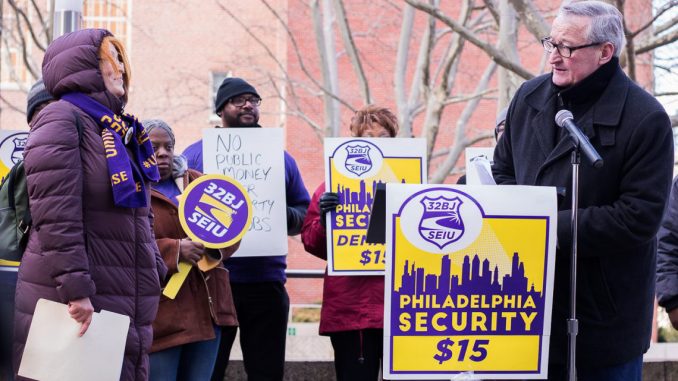
Updated on Feb. 17 at 4:06 p.m.
With Temple holding out on raising its security guards’ wage to $15 an hour, the city is considering pulling the university’s 25 percent discount on its water bill to bring them into compliance with the law.
Though the university said they were willing to work with the city to resolve the wage dispute, revoking the water bill discount “is still an option if the university and its contractors do not come into compliance,” wrote Lauren Cox, a spokesperson for the city, in an email to The Temple News.
In February 2019, Mayor Jim Kenney set a July 1 deadline for Temple and other publicly subsidized city universities and hospitals to raise its security guards’ wages. The prevailing wage law was expanded in 2016 to include universities and hospitals in Philadelphia.
As first reported by the Philadelphia Inquirer in December 2019, Councilwoman Cherelle Parker introduced a bill that would allow Kenney to pull the discount. The bill passed and was signed by Kenney on Dec. 30, 2019, Cox wrote.
Temple’s discount amounted to approximately $556,000 in the fiscal year 2018, Cox wrote.
“We continue to work through this issue with city leadership,” wrote Ray Betzner, a spokesperson for the university, in an email to The Temple News.
Temple employs approximately 400 full and part-time security officers from Allied Universal, according to its 2019 annual security and fire safety report.
“Allied Universal is adhering to the Collective Bargaining Agreements (CBA) regarding the city of Philadelphia’s prevailing wage ordinance and are currently abiding by all contractual obligations,” a spokesperson for the company wrote in an email to The Temple News.
The collective bargaining agreement between Allied Universal and 32BJ SEIU, the service workers union representing the security guards, is set to expire in September, the Philadelphia Inquirer reported. The agreement between Allied and the workers union sets wages lower than $15 an hour but also states that the prevailing wage should override the wages in the contract.
“Since organizing with 32BJ SEIU, our goal remains to lift these workers out of poverty and turn these into well-paying jobs that allow workers to support themselves and their families while giving back to their communities,” said Gabe Morgan, vice president of 32BJ SEIU for Pennsylvania and Delaware, in a statement.
“We are accomplishing that goal by passing laws like a prevailing wage, along with organizing workers and fighting for good contracts,” Morgan added.
Though security guards’ wages are set by Allied Universal and not Temple, “institutions are responsible for ensuring their contractors are following all relevant labor laws,” Cox wrote.
The city is likely targeting Temple as opposed to Allied Universal because it has more leverage with the university, said Todd Vachon, a postdoctoral associate in the department of labor studies and employment relations at Rutgers University.
“They have this subsidy that they grant to Temple, so they actually have a carrot and stick in hand with Temple that’s readily available,” Vachon said. “It’s a little bit less clear what the enforcement mechanism would be if they were to go directly after Allied.”
“It is the responsibility of the public or the publicly funded agency or institution to make sure they are in fact compliant with all the local laws and public expectations,” he added.
Should Temple choose to comply with the city, the university would likely need to renegotiate its contract with Allied Universal and pay more to compensate for the wage change, Vachon said.
“Large institutions receiving thousands, sometimes millions, of dollars in city subsidies and tax breaks can easily afford to pay all their workers a living wage,” said Councilwoman At-Large Helen Gym, the architect of the 2016 prevailing wage law, in a statement. “We can’t build an economy that provides for all Philadelphians unless our major nonprofits also do their part.”
CORRECTION: A previous version of this story incorrectly attributed quotes to Deputy Mayor of Labor Rich Lazer. The quotes were written by Lauren Cox, a spokesperson for the city.



Be the first to comment